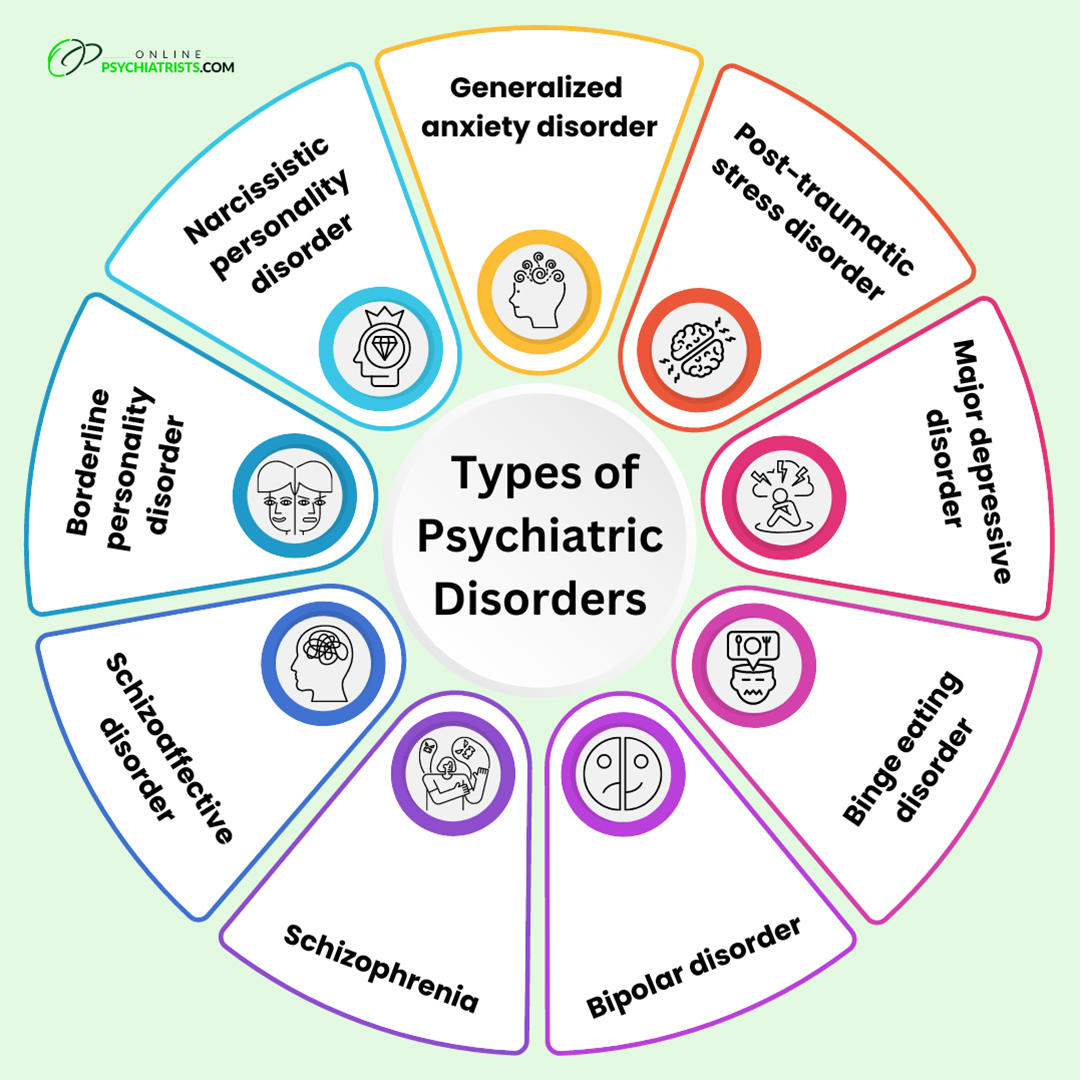

Table of contents
Psychiatric disorders are behavioral, emotional, or cognitive dysfunctions related to significantly distressing events or impairment in social, occupational, or interpersonal functioning. If you are experiencing difficulties with your mental health, do not take it lightly or delay seeing a doctor. Consult Dr. Zlatin Ivanov to find out what a psychiatric disorder is and how it can be overcome so you can live your life to the fullest. He understands that treating psychiatric disorders depends on the specific condition and focuses on early treatment to prevent lifelong, disabling disorders and ensure a speedy recovery.
Mental health affects every facet of our life. It can impact our relationships, career, self-esteem, and ability to communicate effectively and contribute to society. If your mental health is suffering, it will eventually disrupt other parts of your life as well.
Many people hesitate to seek treatment for their psychiatric problems despite its effects on their day-to-day living. While the stigma associated with psychiatric disorders is real, it is essential to note that mental illness is a common and highly treatable condition. Educating yourself and seeking the right mental healthcare professional is the first step towards a better quality of life.
Psychiatry is the branch of medicine that focuses on mental, emotional, and behavioral disorders. The term psychiatric disorder refers to the problems that disturb an individual’s thoughts, feelings, behaviors, or mood.
The American Psychiatric Association has defined mental health disorder as a medical problem involving:
People experience problems with their minds and moods that can affect the way they live or work. Psychiatric disorders are sometimes referred to as mental illness or mental health conditions. It is important to note that psychiatric disorders can be treated, depending on the specific disorder and the scope and severity of the symptoms.
Read more: Why Are Therapists Called Shrinks?
As classified by Mental Health America, there are over 200 types of diagnosable psychiatric disorders that fall into a few different categories, including mood disorders, psychotic disorders, personality disorders, eating disorders, and dementia-related disorders.
While these diagnoses are not mutually inclusive, an individual can be diagnosed with one or more types of psychiatric disorders simultaneously.
Some of the more common ones include:
Remember, these symptoms vary from person to person and can be mild, moderate, or extreme, depending on the severity of the disorder. Many people exhibit only a few symptoms at a time, which often makes it difficult to diagnose the condition. People who seek timely treatment for psychiatric disorders can look forward to managing their symptoms and living healthy, productive lives.

Read more: Hydroxyzine For Anxiety: Side Effects, Dosage, And More
Identifying psychiatric disorders can be a challenge as they may cause different symptoms among different individuals. Here are a few common warning signs you must watch out for:
If you experience any of these symptoms, schedule an appointment with your healthcare provider for timely medical help.
Read more: 6 Different Types Of Depression
There is no one size fits all treatment for mental disorders. Even two people with the same issues may find relief with different treatment approaches. Treatment varies depending on the exact diagnosis and the specific needs of the patient.
Treatment for psychiatric disorders is most effective when it involves one or more of the following:
Psychotherapy is an approach to treating mental health issues by talking with a psychologist, psychiatrist, or another mental health provider. A licensed and trained mental healthcare provider helps to strengthen coping mechanisms, navigate relationships and build self-esteem. Counseling sessions may take place in either one-on-one or in a group setting. During these sessions, the therapist identifies troublesome thoughts and develops strategies to improve and maintain an individual’s mental health and well-being.
Psychiatric disorders are afflictions of the brain, and medications can help to treat the chemical imbalances causing the problem. Some of the most commonly used medications for treating mental illnesses include antidepressants, anti-anxiety, antipsychotic, mood stabilizing, and stimulant medications. These medications relieve symptoms and help return thoughts and emotions to a manageable state.
Your mental healthcare provider helps you make healthier lifestyle choices that equip your mind and body to handle any challenges life throws at you. Trying out new things, exercising, eating, sleeping well, and practicing stress-relieving techniques are just a few of the ways that can prevent you from getting stuck in life and increase your psychological and physical well-being.
If you have been receiving treatment for a psychiatric disorder, an aftercare plan provides you with a roadmap for staying healthy, maintaining your emotional and mental well-being, and coping with stress factors, after resuming your activities.
While some people experience relief with the first treatment, others may have to try a few different combinations of treatment before they find the one that suits them best. Your mental healthcare provider will guide you towards medications and therapies that deliver desired outcomes.
Getting an accurate diagnosis is the first step to managing your psychiatric disorders. Call Online Psychiatrists if you or a loved one is showing signs of anxiety, depression, PTSD, bipolar disorder, or any other condition or if you are not feeling like yourself. Dr. Zlatin Ivanov helps you lead a fulfilling life with the right treatments and aftercare programs that are designed to ease challenges associated with mental illness. He focuses on the symptoms you have been experiencing and recommends treatment plans and guidelines to ensure patient success over the long term.
 Our Locations
Our Locations
The Chrysler Building
405 Lexington Ave, #2601
New York, NY, 10174
Get Directions (Map)
300 Carnegie Center Drive #150K,
Princeton, NJ, 08540
Get Directions (Map)
701 Brickell Avenue, 1550#A,
Miami, FL, 33131
Get Directions (Map)